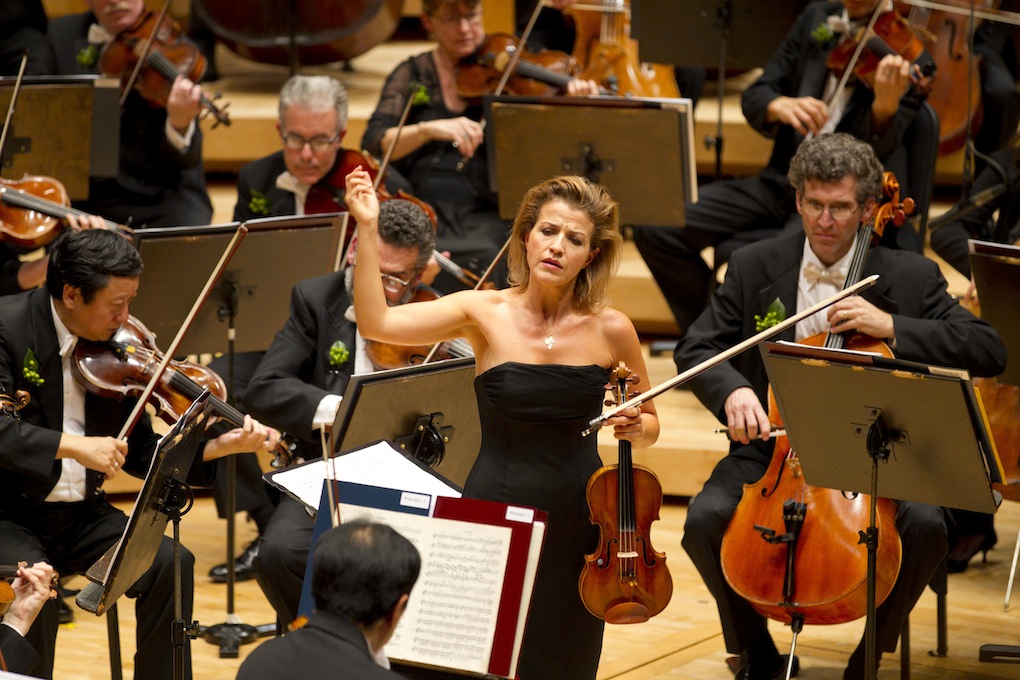Muti takes ill, Mutter takes the helm for CSO’s gala concert

With Riccardo Muti's illness Saturday night, soloist Anne-Sophie Mutter conducted as well as performed as soloist in Beethoven's Violin Concerto. Photo: Todd Rosenberg
Gala symphony events are usually drama-free affairs—at least on stage—featuring a starry guest artist and short undemanding program, the better to get the begowned and tuxedoed guests more expeditiously to the champagne and liver pate.
The Chicago Symphony Orchestra’s “Symphony Ball” program featuring the long-awaited return of Anne-Sophie Mutter took on some unexpected drama Saturday night, with the last-minute announcement that Riccardo Muti had been felled by a sudden, undisclosed, illness.
Though not feeling well, the CSO’s new music director had come to the hall Saturday prepared to conduct the 90-minute program, explained CSO president Deborah Rutter to the packed hall, but was too ill to take the stage.
A shuffling of the program–and removal of the podium—brought a new lineup with the Mozart Symphony No. 34 from this week’s subscription concerts subbing for the slated Rossini and Liszt items. Anne-Sophie Mutter, in her first downtown CSO appearance in 21 years—took on conducting as well as solo duties for the scheduled Beethoven Violin Concerto.
Soloists leading the orchestra are commonplace in Bach and Mozart concertos, but—Pinchas Zukerman, notwithstanding—a rarity with that of Beethoven, due to the greater rhythmic complexity and overall coordinative challenges involved.
Under the circumstances, it was remarkable how finished and eloquent Mutter’s performance turned out to be. As a conductor, she mostly just let the orchestra play, facing them for entrances, leading them on with a gentle swaying movement of her elegant arm.
While recognizing that with the CSO she need not do too much, Mutter clearly knew what she wanted, once firmly gesturing for the cellos and basses to take the volume down a notch.
Perhaps by necessity, this was a more reflective and intimately scaled performance than many, but none the worse for that. If Mutter’s initial entrance was a bit rough and intonation not always airtight, her playing was largely glorious in a searching, often meditative performance of Beethoven’s expansive concerto.
Few violinists before the public can play so quietly with her brand of gleaming intensity, and the soloist brought a confiding intimacy to the Larghetto, paring her tone down to a barely audible golden thread.
The Rondo provided the right contrast, buoyant and taken at a fleet pace. Mutter’s burst of lightning fireworks in her final cadenza made a fine biting contrast to the overall ruminative expression just before the coda’s punchline.
The violinist received thunderous applause and repeated ovations for the evening’s double-duty performance, which she generously shared with her CSO colleagues, motioning many to stand for solo bows.
After several curtain calls, Mutter offered a seemingly impromptu encore with concertmaster Robert Chen of the slow movement from Bach’s Double Violin Concerto, which she dedicated to the ailing maestro. Amazingly put together on the wing, the two soloists played with fine attentive teamwork, the game front desks of the CSO strings backing them with admirable support.
The Mozart symphony also went surprisingly well to open the evening. While less detailed and dynamically nuanced than Thursday night’s reading with Muti, the CSO showed their mettle with a refined and worthy performance.